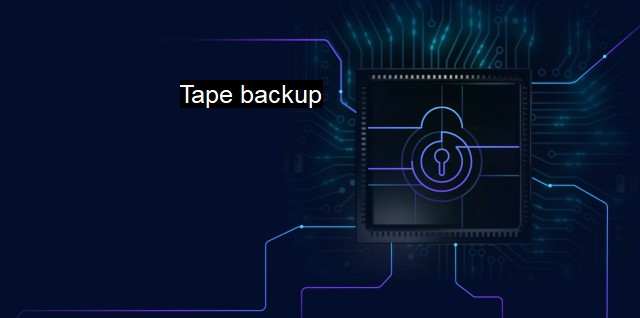What is Tape backup?
Exploring the Role of Tape Backup in Cybersecurity and Antivirus: A Reliable and Cost-Effective Data Backup Option for Businesses.
Tape backup is a data storage system that allows information from a computer to be saved on magnetic tape. It was a prevalent method of backing up large amounts of data long before the rise of external hard drives or cloud storage. Even though it may seem somewhat antiquated technology, tape backup is still prevalent in many business environments today - particularly in the sphere of cybersecurity.Tape backup serves as a key line of defence in cybersecurity strategies as it provides an 'offline' or 'out of band' backup. This means that the backed-up data is not directly accessible or alterable from the original system, allowing for a measure of protection against various forms of cyberattacks. In the event of data destruction or corruption by a viral attack, business operations don't have to be heavily impacted because data can be restored from the tape backup.
One of the main reasons why tape backup is a robust backup solution within the context of cybersecurity is its resistance to a type of cyberattack known as ransomware. Ransomware attackers encrypt a victim's data and demand payment for the decryption key. if this data is backed up offline on a tape, businesses don't need to negotiate with attackers, since they can restore the data from the backup independently.
Increasing cyber threats like spyware, phishing, and rootkits make it necessary to protect data via antivirus programs. no antivirus can offer full protection, as they can only defend against known threats. Therefore, securing a copy of data in tape backup acts as a last line of defence against unknown or yet to be discovered threats.
Tape backup's big advantage in this context is its scalability and large capacity. Modern tape cartridges have immense storage capacities — often well into the several terabytes — and are materially less expensive than equivalent hard disk storage. They are suited for industries dealing with Big Data, such as healthcare or scientific research fields, where the amount of data accumulated is colossal.
It's not all perfect. There can be potential security risks associated with transportation and storage because physical security measures must ensure that tapes, especially those storing sensitive data, aren't stolen, misplaced, or damaged. Regular audits can help in mitigating such risks.
Due to the sequential nature of tape backup, wherein data on the tape is organized chronologically, restoring data can be time-consuming, particularly if you only need to access specific pieces of data stored in the middle or towards the end of the tape sequence.
While Tape backup has a period where they seem to be a feasible solution, technologies such as the Cloud backup typically offer more accessible, immediate, and flexible solutions and therefore are more widely adopted. Cloud backup solutions can also use AI and machine learning to predict and respond to threats, which is quite a leap for cybersecurity and an aspect tape backup cannot match.
There's a convincing case for the continued relevance of tape backup for cybersecurity in specific scenarios. Tape backup can act as an economical, large-volume, and 'offline' data storage solution, adding an additional layer of defence to complement other online digital cybersecurity measures.
In an era of growing online threats and in light of considerable improvements in its technology and capacity, tape backup should not be dismissed as an auxiliary solution to protect valuable data and maintain business continuity. It should be considered in the mix when detailing a comprehensive cybersecurity program, and any antivirus protection strategy should include it. It is indeed an older technology, but it keeps proving its worth in the world of cybersecurity and antivirus.

Tape backup FAQs
What is tape backup?
Tape backup is a method of storing data on magnetic tape cartridges. It is used as a backup solution for organizations to protect their data in case of data loss or corruption. Tape backups are reliable and cost-effective, making them a popular choice for businesses.Why is tape backup still relevant in cybersecurity?
Tape backup is still relevant in cybersecurity because it offers an offline backup solution. This means that the data is not connected to the internet or any network, reducing the risk of cyber-attacks. Tape backups also offer longer retention periods compared to other backup solutions, providing businesses with historical data that can be useful in detecting and preventing data breaches.What are the advantages of using tape backup over other backup solutions?
The advantages of using tape backup over other backup solutions include lower cost per gigabyte, longer retention periods, and offline storage options. Tape backups are also less susceptible to cyber-attacks compared to online backup solutions that are connected to the internet.How often should tape backups be performed?
Tape backups should be performed regularly, depending on the organization's data retention policies and the volume of data generated. It is recommended that businesses perform tape backups at least once a week to ensure that critical data is protected in case of data loss or corruption. However, some businesses may perform tape backups daily or multiple times a day for mission-critical data.| | A | | | B | | | C | | | D | | | E | | | F | | | G | | | H | | | I | | | J | | | K | | | L | | | M | |
| | N | | | O | | | P | | | Q | | | R | | | S | | | T | | | U | | | V | | | W | | | X | | | Y | | | Z | |
| | 1 | | | 2 | | | 3 | | | 4 | | | 7 | | | 8 | | |||||||